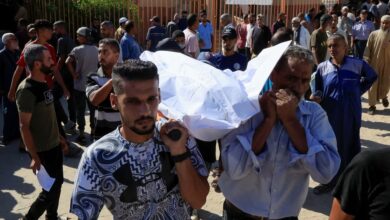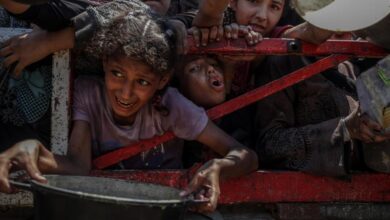Ezzbet Abu Qarn is a place that wealthy and upper middle-class Cairenes see as worthy of donations and campaigns, especially during the holidays. But this Ramadan, the residents of this poor area in Old Cairo aren’t asking for handouts, they’re looking to help the less fortunate.
On a recent night in Abu Qarn, residents huddled around a screen watching videos about the plight of Somalia, where drought has caused a devastating famine, leaving 3.7 million people in a state of food crisis, according to the United Nations.
Most of Abu Qarn lacks sewage systems, potable water or reliable electricity. Most residents live day to day by dealing in scrap metal and recycled materials collected from the refuse of Cairo.
Police officers tend to convince society that the area harbors many of Cairo’s most hardened criminals and drug dealers. Just yesterday, police caught “the most dangerous thug in Old Cairo,” in the words of newspapers, a man from the neighborhood.
But while media attention has been focused on the troubles in Abu Qarn, it has largely overlooked the good. In four days, a local initiative was able to gather over LE40,000 of donations from this area to contribute to the relief effort in Somalia.
For residents in the area, the pictures of the devastation caused by the famine spoke for themselves. Many there said that they more than anyone else in Egypt are able to empathize with the situation in Somalia.
“We don’t have people dying from hunger in our parts, but we do know poverty better than anyone else in Egypt, and we know about the fear of going hungry,” said Gamal Abdel Maqsood, a scrap metal dealer.
The campaign to raise donations for Somalia in Abu Qarn started when a group of young men were moved by the images they saw in the media, and decided that the famine in Somalia must become a priority.
“We put a slide show together, and we decided to raise awareness everyday until the end of Ramadan and try to collect donations as well,” said Hany Abdel Hamid, one of the organizers.
Over the past week they were overwhelmed with the response from the people in their neighborhood as residents of all ages and social situations rallied to pour money into the effort.
“There are old widows who rely solely on charity to stay alive, who donated what I know is a really large amount for them,” said Sayed Kamal, another organizer.
For many in the area, it is the first time an aid campaign had such an effect on the people.
“During the Bosnia Herzegovina massacres and Gaza bombing in 2009 there were decent campaigns in this area, but I never saw this kind of a reaction from the people here,” said Hany Nagy, who sells liver sandwiches on the street for a living.
Nagy was so moved by the images of the famine in Somalia that he began to make sure he didn’t buy any more food than his family would eat, so as not to be wasteful.
Young children stopped by the slideshow that the organizing group set-up, with many volunteering large chunks of their allowance to the cause.
Ibrahim Hassan, a 14-year-old student, was on his way over to play computer games in a local shop, when he happened by the presentation.
“I gave LE5, and I had LE10 in my pocket, for the people who were dying,” he said. “This means that I will play computer games for 2 or 3 hours this week, instead of 5 or 6.”
On Monday alone, the organizing group gathered over LE4000 in one of the three collection areas alone.
“We go around the neighborhood. Children will put in LE1 or something small, some families would take out larger bills. That is how we raised a majority of the funds,” said Abdel Hamid.
While there are some wealthy merchants in Abu Qarn, Abdel Hamid says that only a handful gave sizeable donations. He says wealthy donors contributed around LE12,000 of the LE40,000 he collected so far; the rest is from people from the middle and lower-middle classes.
“Everyone wants to feel like they are somehow contributing. In areas like this, the poor understand the importance of standing with other poor people, even though the kind of poverty there is something beyond our imagination,” said Fouad Senousi, 53, who collects recyclables for resale, and who himself barely gets by on a daily basis.
Some residents in the area complained that there are some con artists who pretend to be taking money for Somalia. However, this group tallies all the money in the open, and comes back with receipts from the Arab Medical Union’s Relief Committee, where they deposit the money.
“The majority of money we’ve gotten for the Somalia campaign was from working-class neighborhoods (like Abu Qarn) and based similarly on independent initiatives to collect donations,” said Sarah Gamal, who is in charge of media outreach for the Relief Committee.
So far, the committee has collected over LE40 million for the famine in Somalia. They are operating in Mogadishu as well as in the refugee camps on the Kenya-Somalia border in the south of the country.
Around LE15 million has been distributed as direct food donations to around 500,000 Somalis, while the rest goes toward medical aid and sustainable solutions to famine. The Arab Medical Union estimates that in Somalia, LE65 can provide very basic nutrition for one person for a month.
While getting into Mogadishu is notoriously difficult, the Shabab al-Mujahideen, the hardline Islamist group that controls the area, have been more welcoming to Arab and Muslim relief organizations, but reportedly still remains hostile towards Westerners.
The Relief Committee is also sending supplies with a military plane sent by the Supreme Council for Armed Forces, Egypt’s military rulers.
“The SCAF finally allowed us to use one of their planes to send supplies directly to Mogadishu,” Gamal said. On Friday they are sending medical supplies aboard the plane.
Gamal added that the famine in Somalia piqued the interest of many parts of Egypt that were previously removed from these types of events.
“So many parts of Upper Egypt, the Red Sea, and Sinai called us, asking how to donate. This didn’t happen as much before,” she said.
Perhaps one of the keys to understanding this phenomenon comes from Abu Qarn.
“Before, we used to think we were poor. But in Egypt, people always have each other, and the crisis in Somalia is making me thank God for what I’m blessed with, and help others who aren’t,” said Senousi.




